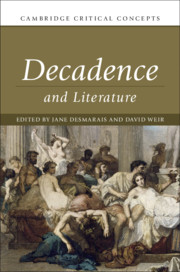Book contents
- Decadence and Literature
- Cambridge Critical Concepts
- Decadence and Literature
- Copyright page
- Dedication
- Contents
- Figures
- Contributors
- Acknowledgements
- Introduction
- Part I Origins
- Chapter 1 Decadence in Ancient Rome
- Chapter 2 Decadence and Roman Historiography
- Chapter 3 Nineteenth-Century Literary and Artistic Responses to Roman Decadence
- Chapter 4 Decadence and the Enlightenment
- Chapter 5 Decadence and the Urban Sensibility
- Chapter 6 Decadence and the Critique of Modernity
- Chapter 7 Decadence and Aesthetics
- Part II Developments
- Part III Applications
- Select Bibliography
- Index
- References
Chapter 2 - Decadence and Roman Historiography
from Part I - Origins
Published online by Cambridge University Press: 12 August 2019
- Decadence and Literature
- Cambridge Critical Concepts
- Decadence and Literature
- Copyright page
- Dedication
- Contents
- Figures
- Contributors
- Acknowledgements
- Introduction
- Part I Origins
- Chapter 1 Decadence in Ancient Rome
- Chapter 2 Decadence and Roman Historiography
- Chapter 3 Nineteenth-Century Literary and Artistic Responses to Roman Decadence
- Chapter 4 Decadence and the Enlightenment
- Chapter 5 Decadence and the Urban Sensibility
- Chapter 6 Decadence and the Critique of Modernity
- Chapter 7 Decadence and Aesthetics
- Part II Developments
- Part III Applications
- Select Bibliography
- Index
- References
Summary
Decadence was not a word used by the historians of ancient Rome during classical antiquity, but the concepts, anxieties, and fears encapsulated by it are without question present in their works. Ancient historians such as Livy, Sallust, Tacitus, and Appian describe an idealized past in order to draw a contrast with an immoral, inferior present. Spurred on by literary accounts from antiquity, Enlightenment authors such as Montesquieu, a political theorist, and Edward Gibbon, a historian and Member of Parliament, were particularly interested in studying Rome to learn the symptoms of imperial decline. Thus, this chapter explores the language of decadence in the early histories of the Roman Empire, up to the fall of Constantinople in 1453, including why later historians such as Niebuhr and Mommsen wished to challenge this language (present from antiquity) and disentwine decadence from Roman imperial history for good.
- Type
- Chapter
- Information
- Decadence and Literature , pp. 30 - 46Publisher: Cambridge University PressPrint publication year: 2019
References
- 3
- Cited by

